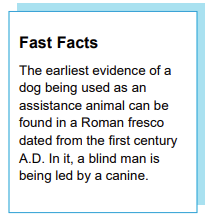Lassie Leads the Way– Alzheimer’s Assistance Dogs Lend a Helping Paw
Seniors and Alzheimers | October 10, 2022
Pet therapy has been shown to be particularly very helpful to Alzheimer’s patients and those affected by other dementias. Pets, and dogs, in particular, can calm those affected by dementia, help them stay active (Dogs love to walk!), and help them stay social through interactions with passersby who cannot resist these fuzzy companions. Dogs in general often provide enjoyment for those dealing with dementia. It has been shown that dementia patients have a greater appetite following a visit from a canine companion.

The good news is there may be new promise in the area of pets helping people with dementia. Imagine dogs trained to remind a person to eat and take medication, or lead a person with dementia back home. Even more impressive, imagine these dogs could accomplish all of these tasks without receiving any verbal command. Does this sound farfetched (no pun intended)?
Considering the demeanor and intelligence level of certain dogs, this idea is not as crazy as it seems. In fact, today there are approximately six dogs in the world trained to do exactly these types of tasks through two projects, one based in Germany and one based in Israel, and more dogs are being trained.
Unlike traditional pet therapy, which mostly offers companionship to the Alzheimer’s patient, these two projects have undertaken training assistance dogs specifically to aid Alzheimer’s and other dementia patients with completing daily tasks, thus allowing the person to have greater independence.
This type of training is not for all dogs; it is the most demanding type of service dog training. Since their main task is to bring their human companion home when lost (or bark for help if necessary) dementia assistance dogs are specially chosen based on whether they are capable of assisting without commands and adapting what they have learned to new situations and settings. They also must be resilient enough to tolerate the frequent mood changes from which those with dementia frequently suffer.
Early pilot studies with these clever canines are promising, and dementia patients and their families have had highly positive results. Perhaps one day shortly, these carefully trained companions will be coming to a city near you.
References
Cohen, J. (August 8, 2011). Assistance dogs: Learning new tricks for centuries. History in the Headlines. Retrieved from http://www.history.com/news/assistance-dogs-learning-newtricks-for-centuries
Coren, S. (January 21, 2014). Assistance dogs for Alzheimer’s and dementia patients. Psychology Today. Retrieved from. https://www.psychologytoday.com/intl/blog/canine-corner/201401/assistance-dogs-alzheimers-and-dementia-patients
Dementia Dog. (n.d.). Our dogs. Retrieved from http://www.dementiadog.org/
Rugg, L. C. (n.d.). Alzheimer’s aid: Lassies become loyal friends. Retrieved from
http://www.kingsvalleycollies.com/versatile/alzheimer-s-aid.
Shiboleth, M. (n.d.). Remember for me–The Alzheimer’s aid dogs. Retrieved from
http://www.kingsvalleycollies.com/about/alzheimers-aid-dogs
Vann, M. (April 20, 2010). How animal therapy helps dementia patients. Everyday Health. Retrieved from http://www.everydayhealth.com/alzheimers/how-animal-therapy-helps-dementia-patients.aspx
Online version: http://www.comfortkeepers.com/home/info-center/articles
Individualized Home Care Options
Long-Term Home Care, 24 Hour Home Care & Short Term Care Options Customized for You








